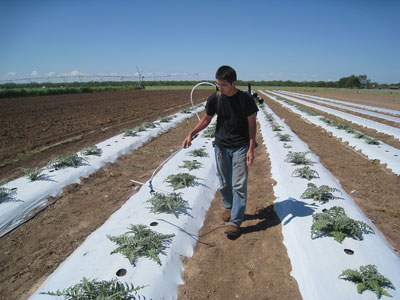
Features
Production
Research
Researchers helping reduce vegetable transplant shock
January 12, 2010 By Paul Schattenberg
UVALDE – Dr. Daniel Leskovar, a Texas AgriLife Research plant physiologist at the Texas AgriLife Research and Extension Center in Uvalde, has been investigating ways to help vegetable plants make a less stressful transition from the greenhouse to the field.
UVALDE – Dr. Daniel Leskovar, a Texas AgriLife Research plant physiologist at the Texas AgriLife Research and Extension Center in Uvalde, has been investigating ways to help vegetable plants make a less stressful transition from the greenhouse to the field.

|
| Research at the Texas AgriLife Research and Extension Center in Uvalde includes investigating the application of gibberellic acid, or GA, on artichokes. (Photo courtesy of Texas AgriLife Research) Advertisement
|
“This research can aid in the successful production and possibly even the further profitability of some vegetable crops by producing high-quality, more adaptive plants that will establish well,” Leskovar said. “It could also enable some vegetable plants to produce beyond their regular season or succeed within a stressful growing environment.”
An expert in vegetable physiology, Leskovar said his research has been “centered in the identification and understanding of plant adaptation mechanisms to temperature, water and biological stresses as part of an integrated vegetable cropping system.” He and his collaborators already have been successful in creating heartier pepper, tomato, watermelon and cantaloupe seedlings for transplantation.
Leskovar has been joined in his research efforts by other AgriLife Research personnel, including researchers from the Texas AgriLife Research and Extension Centers in Weslaco and Amarillo, and a researcher from the Institute for Adriatic Crops in Croatia.
“Our work has primarily involved modulating naturally occurring growth regulators in vegetable plants,” Leskovar said. “One of these is abscisic acid, or ABA, which is a hormone naturally produced by the plant.
“Abscisic acid affects the closing of plant stomates and controls plant physiology such as leaf transpiration,” he said. “The hormone also slows plant growth temporarily, which is important for producing compact transplants in commercial nurseries.”
High temperatures, dry winds and rapidly drying soil after planting are detrimental to or impair the early growth of vegetable transplants, Leskovar said.
“Results of our previous research suggested abscisic acid was an effective tool to modulate transplant shoot growth and enhance drought-stress tolerance of several vegetable species,” he said. “Now our research is being targeted toward foliar spray application to control growth of mature vegetable transplants in the greenhouse.”
Leskovar noted vegetable plants often suffer transplant shock because of an imbalance between water loss through transpiration and water absorption through the roots, typically causing plant wilting. He added that windy conditions or high temperatures can accelerate water loss.
“Abscisic acid closes the stomates and reduces water loss through transpiration, preventing further moisture loss in times of low water availability,” he said.
Research efforts to date have shown that external application of abscisic acid to cabbage, watermelon and pepper transplants had reduced undesirable excess shoot growth during plant development in the greenhouse environment, Leskovar said. They also show that its application on pepper, tomato and artichoke seedlings was superior to that of other commercial “film-forming antitranspirants” in improving overall plant water status.
Print this page